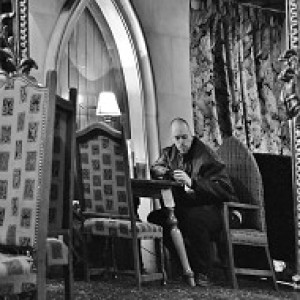Blue and White and Black
On the eve of the new Premier League season, I've acquired an appropriate book, one I've wanted to read for some time. I bought it principally as research for my ongoing novel - to flesh out some details about an era I've already heavily researched in the past - but a few pages in, I already feel that it's necessary reading for reasons above and beyond my own writing.
The book is Samba In The Smethwick End, a history of The Three Degrees (Cyrille Regis, Laurie Cunningham and Brendan Batson, the first three black players fielded in a single English team: West Bromwich Albion, my own club). It's written by Dave Bowler - a white Albion fan - and Jas Bains - a non-white Wolves fan - and deals with the racism that the Three Degrees encountered, their impact on the game and society as a whole, and the context of what their achievements meant both to the West Midlands, and England.
I grew up with the local tales that lauded Batson, Regis and Cunningham, to the extent that I've always seen them as heroes, and I've frequently been shocked over the years to read and hear about the abuse they received. And every time you think you've reached the depths of how bad things were for them back then, you uncover something else that makes you put your head in your hands.
The book is unapologetically hard-hitting - sometimes disturbingly so - and yet mesmerisingly written, demanding your attention from the opening chapter:
"'If you want a nigger for your neighbour, vote Labour.' Recognise the tone? Is it the National Front? The British National Party, perhaps? No, it's the voice of sweet reason that has for so long characterised the Conservative and Unionist Party.
That was an 'unofficial' slogan that the Tory candidate for the Smethwick constituency used in the October 1964 General Election...[the] odious line was enough to win the Conservative candidate Peter Griffiths a formerly safe Labour seat, unseating Patrick Gordon Walker...it was felt Gordon Walker had been made to pay for his supportive stance on immigration, a position he had made clear during a major speech in 1961...Years before Wolverhampton MP Enoch Powell delivered his infamous 'rivers of blood' speech in nearby Birmingham in April 1968, the Black Country was already disfigured by racial mistrust and prejudice.
Thirteen years later, 31 August 1977. A sparsely populated Smethwick End at The Hawthorns, home of West Bromwich Albion, the bulk of fans standing on the Birmingham Road End terraces. A routine Football League Cup fixture...Albion 2-0 ahead, a penalty awarded. All round the ground, the call goes up, 'Cyrille, Cyrille'. Cyrille Regis is given the ball, smashes home the penalty, then scores another goal to finish a 4-0 victory, and, within 90 minutes, he's made himself the new hero of The Hawthorns, supplanting Jeff Astle as 'The King'. And the new King was a black man.
A couple of weeks later, the same Smethwick End, packed to capacity. This time, it's full of Wolves supporters for the local derby. At the back of the terraces are corrugated iron sheets. Throughout the game, the Wolves supporters drum on these in a jungle rhythm, and thousands of voices chant 'Nigger, nigger, lick my boots' or 'Pull that trigger, shoot that nigger', abuse aimed at Regis and Laurie Cunningham, who wasn't even on the field that day.
Nigger. If you're white and can read that word without flinching, you really haven't been paying attention these last thirty years, have you? It's still there, one of the great taboo words, one of the most vicious, insidious, nasty words in our vocabulary. For the moronic white supremacist, it's that word above any other that supposedly signifies the superiority of the white race over the base black man, although any people that can only define themselves and proclaim their perfection by abusing others has far more problems than it can ever deal with. For many a white liberal, it's the term that strikes fear into the bleeding heart, in case it should suddenly leap into the brain, unwanted, unbidden, but there, there, there, making us wonder if deep down we don't all have a germ of prejudice in us. For the black community, it's yet another word from the great litany of possible abuse. Sometimes vitriolic, sometimes casual, always offensive...it remains a hateful, shameful word.
One word. In 1964, it won a parliamentary constituency. In 1977 it was central to the transformation of football. Much of that transformation was wrought in the Black Country."
So it's with these hefty thoughts on the brain that I welcome the return of the sport I've loved all my life. A sport that has yet to see a significant breakthrough of British Asian players. A sport that has witnessed only one openly gay professional player to date, who eventually committed suicide due to the abuse he received.
Still, Sam Cooke once said that a change is gonna come, and I have faith that it usually does. However, it takes pioneers brave enough to pave the way, and it takes supporters brave enough to champion them. Here's hoping that the spirit of '77 has not been lost for good.
(For anyone interested in seeing more of Batson, Regis and Cunningham, this famous match against Manchester United in December 1978 is considered one of the greatest performances of both The Three Degrees and the Albion team as a whole in that era, all in the face of audible racism from the Old Trafford terraces).
- 0
- 0
- 7.2mp DigitalCAM
- 1/50
- f/2.8
- 6mm
- 200

Comments
Sign in or get an account to comment.


